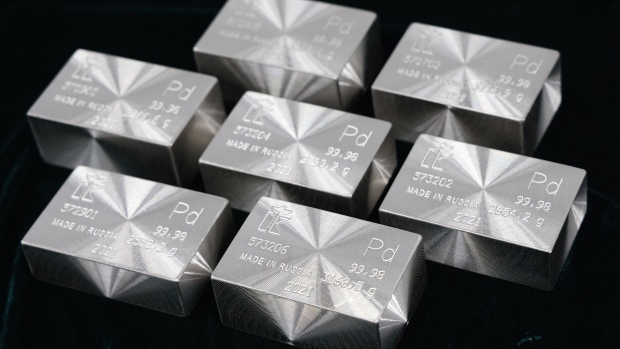Nov 10, 2023
UK Sanctions on Russian Plant Send Jitters Through Palladium
, Bloomberg News

(Bloomberg) -- The cost of borrowing palladium has climbed since the UK imposed sanctions on a key Russian refiner earlier this week, reflecting bets that it may lead to supply disruptions.
Britain on Wednesday announced sanctions on Krastsvetmet JSC, which is the main refinery used by top palladium producer MMC Norilsk Nickel PJSC. If Western companies seek to avoid products processed at the refinery in response to the sanctions, Norilsk — which accounts for about 40% of global output — may struggle to find a more palatable alternative.
The news has left the palladium market flashing conflicting signals. On the one hand, spot prices dropped to a five-year low, extending a months-long slide driven by global economic headwinds and tighter monetary policy. It traded down 3.2% at 10:23 a.m. in London on Friday.
However, the interest charged to borrow palladium metal for six to 12 months rose from 0.1% on Wednesday to about 0.6% on Thursday, according to traders familiar with the matter. The move reflects bets on supply disruptions after the sanctions on Krastsvetmet, the traders said.
Higher lease rates signal more traders are looking to borrow palladium to secure it for future use. By locking in what is effectively their interest payments now, they can profit from lending it out again if scarcity causes lease rates to rise further.
Newly minted Russian platinum and palladium ingots have not been traded in the London bullion market since early 2022, when Russian refineries were barred by the market authority. However, Russia has remained an important source of supply for industrial users, who face no restrictions on buying the metal that is mostly used in catalytic converters to reduce emissions in petrol vehicles.
Krastsvetmet refined 98 tons of platinum and palladium in 2022, according to a company report, which is close to the level of Norilsk Nickel’s output last year. While Norilsk Nickel technically has the option to process its metal in refineries outside Russia, it requires government approval and licensing to do so. Russian law mandates precious metal refining to take place inside the country.
The US imported $1.4 billion worth of palladium last year from Russia, according to UN Comtrade, with Japan, China and Germany also major buyers.
Still, while some traders are betting on supply problems, the sanctions announcement hasn’t been enough to turn around dire sentiment in the palladium market. Prices have fallen 46% this year due to economic headwinds that reduced demand for new cars, alongside substitution for cheaper platinum.
Norilsk Nickel’s press service declined to comment on the possible effect of the sanctions against Krastsvetmet. The miner, which is not sanctioned, is independent from the refinery, which is owned by the Krasnoyarsk region in Russia.
(Adds data on Russian metals refinery in seventh paragraph)
©2023 Bloomberg L.P.






